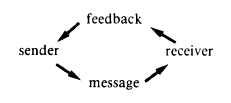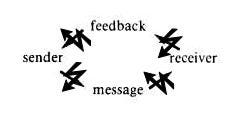Navigating a Whackadoodle World: Episode 41, or What are the barriers to Communication and Understanding?
A Whackadoodle discussion with my student in which I let her lead our talk about communication barriers.
Click here if you would like to view Navigating a Whackadoodle World’s Table of Contents

“I have been thinking a lot about communication barriers,” she told me unexpectedly.
“What made you think of them?”
“I suppose that I’ve just been noticing how often communication breaks down between people these days. Plus,” she added sheepishly, “I was reading your book the other day.”
“Chapter twelve in preparation for this week’s Guidepost on Communication and Understanding?” I teased.
“Yeah,” she sent me a half grin. “I was a bit taken by the section about how the communication cycle works and how communications breaks down. I hadn’t really considered things like prejudice, emotion, and attitude communication barriers before.”
“So you think we should talk about about communication barriers in this week’s guidepost?” I offered.
She pulled out a dog eared copy of my book and turned to chapter twelve. “I think we should actually quote this part,” she said, pointing to a specific paragraph.
“Okay,” I agreed, and we did:
Communication is circular. We usually send a message because we’re hoping for a certain response. But too often we don’t consider how our message must be sent to insure that we get our desired response. We just start talking, and then we get frustrated whenever people don’t react as we’d like. We fail to say what we mean, and then we fight over whatever we said. We can listen to people so long as we agree with them; but the moment we disagree, we stop listening and start defending our perspective.
Communication is not about agreeing; it’s about understanding.
The word communication is derived from the Latin word for “common.” In other words, communication is the ability to bring separate minds together in a common understanding. Whenever we sincerely communicate with people, we create rapport. What is rapport? The dictionary defines it as, “a connection between people, an affinity, a harmonious, or sympathetic relationship.” But too often, people use communication to prove a point, not to create rapport…If your attempts to communicate with people don’t create rapport with them, then perhaps you need to find some new ways to communicate.
Communication is a revolving process. You send a message. Someone interprets your message and sends back a response. You interpret their response and send another message, and so the cycle continues.
Source: A River Worth Riding: Fourteen Rules for Navigating Life, Chapter 12
She looked up from the post and said, “I actually made a sort of graphic that I think shows what you mean by communications cycle.” She grabbed a paper that she had stuck between the book leaves. “See,” she offered pointing. “The sender sends a message. The receiver get the message and sends back a response, which the original sender receives. Circular, right?”
“Very nice,” I said looking at the small graphic.
In a rush, she turned the page over, “Then I did another graphic showing where the cycle breaks down,” she continued. “It can break down if the sender is having trouble conveying the message. Like if he can’t find the right words. It can break down if the receiver misinterprets the message, or if he has trouble conveying an effective response. Finally it can break down if the original sender misinterprets the response. Like this, see?”
“Very, very nice,” I smiled.
“So it seems to me,” she went on, shoving the graphic back into the book. “It seems to me that we need to go over the possible barriers that might cause the breakdowns. You know, so people can become more aware of them. You list a lot of them in your book, but I think they could use some examples.”
“Examples huh?” I echoed.
“Not for all of them,” she assured me. “But definitely for some of them.”
“Okay,” I said. “You name a communication barrier and we’ll take turns coming up with examples.” And that’s just what we did:
Noise
“I think noise being a barrier is obvious,” I told her. “I mean anyone who has tried to hold a deep conversation in a factory, or at a football game, or with the television blaring can attest to that. Really deep conversations belong in quiet places without interruptions.”
Technology
“Oh,” I said immediately. “This barrier has to do with technologies that can get in the way of communication. Things like bad earing aids, talking while texting, talking while scrolling, or the Internet in general.”
“How is the Internet a communication barrier?”
“Have you ever watched Catfish?” I asked her. “People on the Internet pretending to be somebody they’re not. And that’s not even the whole of it. When all you have to go on is the written word, there are so many ways that communication can break down. You can’t read body language, or hear tone. You don’t know if people are being serious, sarcastic, or something else entirely. It’s hard to have a real back and forth conversation online. That’s why online debates should be avoided at all cost. You are bound to be misunderstood by someone.”
Interruptions
“This barrier’s pretty obvious to,” she offered. “Nobody can keep a train of thought if people keep interrupting.”
“Are you aware of the three types of interruptions that cause break downs?”
“I’m not sure,” she admitted.
“The first is where other people keep interrupting both the sender and the receiver, like with phone calls, and direct messages, and such. The second is when the sender is interrupting the receiver; like when you’re trying to read a book, or watch a movie, or have finally broken through writer’s block, and someone just comes in and starts talking to you.” I took a moment to morn the words that I’d lost because I was interrupted while writing. “The third is when the receiver interrupts the sender; like when you’re telling a funny story but never get to the punch line because the receiver suddenly interrupts with a funny story of their own.”
“Oh man,” she said. “My brother does that all the time.”
“Annoying isn’t it?”
“Very.”
Prejudice
“I’ve got this one,” she said immediately. “Communications break down if either the sender or the receiver feel some sort of prejudice about each other, right?”
“Right,” I nodded. “And what kind of prejudices are we talking about?”
“Well, if I were to guess,” she paused then grinned. “I would guess racism, sexism, ageism, classism, misogyny and homophobia.”
“You’ve been studying,” I accused. “But don’t forget political prejudice. That one has been popping up a lot lately.”
Status
“Isn’t Status like classism?” she asked uncertainly.
“Yes, and no,” I answered. “Classism is prejudice based on the socioeconomic status of a person. It’s were I would treat rich, powerful people with more respect than street people, or coworkers. On the other hand, Status is less about people’s position to you, and more about your position to them. For example, if I am your teacher, I have a responsibility to point out your mistakes and help you find alternatives. If I’m your friend, or a member of your family, it might not be my place to comment. And if you’re my boss, my comments might be taken as insubordination.”
“So you’d edit what you might say based upon someone’s status, thereby creating a communication barrier.”
“Exactly,“ I nodded.
Assumptions
“I think I can see why assumptions are a communication barrier,” she said confidentially. “If I make an inaccurate assumptions about you, or about what I think you are saying, I am likely to react in an ineffective way.”
“And how do you avoid inaccurate assumptions?”
“I suppose that I could use paraphrasing and confirming questions. Something like, ‘I think you’re saying….. Have I got that right?’”
“You got that right,” I agreed.
Vague or conflicting definitions
“I suppose this barrier happens when I use words you don’t really understand, or understand differently,” she said.
“Can you think of an example?”
“Well,” she thought for a moment. “I once had a friend who kept trying to describe a guy in our class. She kept saying he was pretty tall, so I kept thinking of all the tall guys I knew. We were both getting really frustrated because we couldn’t remember his name, when I suddenly realized, she’s 5’ 3”, and I’m 5’ 11”. Turns out the guy was tall to her, but short to me.”
“Good example,” I said. She moved on quickly to the next barrier.
Emotions
“This one has got to be because when we are emotional we often say confusing, or hot headed things that we would never say if we were not emotional.”
“True enough,” I confirmed. “And now we come to ‘Attitude Barriers’, and that one, I think I should explain.”
Attitudes
“When when dealing with attitude barriers,” I continued. “We have to consider four forms. One form might be the attitude I have towards the person with whom I’m speaking, another might be my attitude towards the topic.”
“Let me guess,” she interrupted. “The other two forms are the attitude that someone might have about me, or their attitudes towards our topic. Either way, the situation would edit the way we both communicate.”
“Your assumption was correct,” I acknowledged..
Misunderstandings
“Oh, oh oh,” she said excitedly. “For this one you have to tell your ‘IT’ story.”
“You want me to quote my ‘IT’ story?” I repeated
“Yeah, it’s a good example of misunderstanding and a funny story.”
“Okay,” I said, and did as she asked.
I once went to Taco Bell with a friend. We were racing to grab our dinner before watching a movie at his house. As we began pulling out of his drive, we realized that my car was blocking the way. So I jumped from his car, re-parked my car down the road a bit, and scrambled back into his passenger seat. We tore off together, ordered our food and headed back to his place. At the edge of his driveway, he stopped and pointed to my car.
“Do you want to move it back?”
“Nah, I’ll just leave (it).”
“Really?”
“Yeah, it’s okay.”
The next thing I knew, he was driving me to my car and saying, “Okay, then good night.”
“How weird,” I thought. “What happened?” I figured that he wanted me to leave, so I got out of his car in a daze and said, “Good night.” I drove home, still confused, wondering why he’d suddenly decided to turn me out; when a few blocks from my house, I suddenly realized that he’d not heard me say the word “it”.
I had said, “I’ll just leave it.”
He had heard, “I’ll just leave.”
Our evening ended with confusion and hurt feelings, simply because I had slurred the word “it,” and neither of us had stopped to clarify our confusion. Instead, we chose our actions based upon inaccurate information, and we reaped the benefits of cold food eaten alone.
I know that I’m right because I asked him about ‘it’ the next day, and we both had a well needed laugh.
Source: A River Worth Riding: Fourteen Rules for Navigating Life, Chapter 12
Techno-babble/Jargon
“Oh, this has got to be when you go to an expert and they start using words you don’t understand; or you sit in a math class and they start using words like derivative, integral, distribution, bell curve, coefficient, and Pascal’s triangle,” she said excitedly.
“It’s also when people use acronyms you have to look up, or emojis you can’t decipher.”
“You know,” she continued without listening. “I one saw a definition for Pascal's triangle that called it a ‘visual representation of coefficients arranged in a triangular pattern.’ Even the definition made no sense to me.”
“Maybe you needed an image to help you understand?” I suggested. “Sometime images can explain more than jargon.”
We got out her iPad to find a Pascal's triangle. “Oh my god,” she said the moment she saw one. “I know these.”
“We use to use those in forth grade math,” she rushed on. “The two numbers above any number have to add up to the number below, but I never knew what they were called. I just thought they were torcher devises.”
“And now you know what to call them.”
Unclear thoughts
“This one is very obvious,” she informed me immediately. “If you aren’t sure of what you want to say, it’s very unlikely that you can explain yourself clearly.”
Defensiveness
“And how about defensiveness?” I asked.
“Well, that seems obvious too. If someone feels defensive, they aren’t going to listen to you. They’re going to try defending themselves. Right?”
Criticism
“And criticism?” I asked after nodding.
“Well if you criticize people, aren’t they likely to start feeling defensive?”
“I’d say so,” I agreed.
“Hey, don’t you have something in your book about how to give constructive criticism?”
“Yes,” I admitted, holding up a hand. “But that is from another guidepost, and we will not include it here.”
“Fine, fine, fine,” she sighed. “Of course, the next one is also obvious.”
Boredom
“If someone is bored,” she continued without stopping. “They are not really listening. People who don’t listen are always a barrier to communication. The last two though,” she added. “They both need some explanation.”
Weaponized Words
“Okay,” I took some time to think. “When I think about how words can be weaponized, I immediately think of Global Warming,” I told her.
“Global Warming?” she echoed uncertain.
“The term Global Warming got weaponized when I was your age.” I informed her. “We knew about Global Warming way back in the Nineteen Seventies. President Carter even put solar panels on the White House to draw attention to the issue. In his announcement about the panels, he called them, ‘The power of the sun to enrich our lives as we move away from our crippling dependence on foreign oil.’ Reagan removed the solar panels when he took power.”
“So how was the word weaponized?
“It was because of the word warming,” I explained. “Every time we had a colder than usual year, someone in power would say, ‘How can the globe be warming when we have colder winters each year?’ They would even bring snow balls on into the Senate to make their point.”
“No!”
“Yes,” and I posted an example:
“But he says it was unseasonal weather. He says it right at the end,'“ she said after watching it.
“Yeah, but nobody even noticed that moment. They just enjoyed reporting the snowball show.” I smiled. “It was some time after that the people who believed in Global Warming took back the idea by changing it’s name to Climate Change. No Senator could bring in a snowball into the Senate to explain the change in climate. We could see for ourselves the devastating droughts, the increasing wild fires, the once in a lifetime hurricanes and tornadoes that hit every year. The climate is changing. It’s hard to weaponize a well defined term.”
“Is Woke another word that people has weaponized?” she asked.
“The fact that you felt the need to capitalize it should tell you that it has been weaponized. What was once a word parents would use with their kids to remind them of why they needed to stay aware of the prejudice around them, has become something else entirely. It has become politicized and weaponized by people who have changed its meaning.”
“Can people really change the meaning of words?”
“They do it all the time,” I laughed a sour laugh. “Consider the word Freedom. I know that for some people, freedom has come to mean their freedom to impose their beliefs on you. Consider book bans, in which parent claim the freedom to ban books because they don’t want their children around books your kids might want to read.”
She didn’t say anything, so I moved on to the last barrier.
Deflection
“This one is easier than you think,” I told her. “It’s when people refuse to answer your question. You ask them a direct, yes or no question, and they bring up something else. They talk about what they want to talk about. They talk about what someone else did ten years ago. They change the subject because they are afraid of answering your question.”
“Yeah,” she grimaced. “I’ve see too much of that one myself.” A few minutes later, she looked up to say,
“So I guess that’s it. We’re done. We’ve explained them all.”
“You know there are more barriers to commutation out there,” I warned.
“Yeah,” she shrugged. “but I think we got a lot of them.”
“Feels like a downer to end this episode on,” I mentioned.
“So, lets end it with a riddle,” she suggested. “I’m tall when I’m young, and I’m short when I’m old. What am I?”
“I have no idea,” I laughed.
“I’m a candle,” she informed me. “Get it? Tall when I’m young. Short when I’m old.”
“Yeah, I get it,” I answered, laughing harder.





